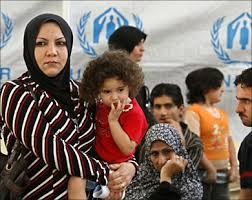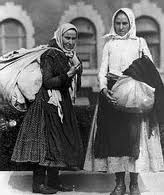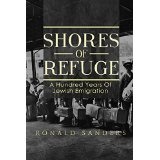Notes From the Lampert Library
 Immigrants and immigrations – or should I say emigrants and emigration – have been much in the news these last weeks. Fleeing from violence, leaving their homes, children and adults are looking for a haven from warfare and religious intolerance. We call them refugees.
Immigrants and immigrations – or should I say emigrants and emigration – have been much in the news these last weeks. Fleeing from violence, leaving their homes, children and adults are looking for a haven from warfare and religious intolerance. We call them refugees.
This all made me think about our own Jewish emigrants who fled their homes and moved west. Between about 1880 and 1925, at least two million Jews left central and eastern Europe for the US. They left for many of the same reasons that force today’s emigrants from their homes: war, poverty, religious intolerance. In many cases, they felt they had no choice but to leave their homes.
A bit more than a century ago, both of my teen-aged grandfathers left their parents’ homes. One fled because he had a price on his head; the other left for economic reasons. They never saw their parents again. As for my grandmothers, as very young children they came with their parents who established businesses of sorts in the cities where they settled.
Many of us share similar stories.
All these emigrants sought a better life in the West be it Western Europe or North America.
 My -and many of our – parents, grandparents and great-grandparents- were fortunate to find a country that needed labor. While they were not always welcomed with open arms and often felt social prejudice, most were able by dint of hard work and education to rise in American society. There was opportunity in a growing nation’s growing economy. Statistically, Jews have succeeded far beyond our numbers.
My -and many of our – parents, grandparents and great-grandparents- were fortunate to find a country that needed labor. While they were not always welcomed with open arms and often felt social prejudice, most were able by dint of hard work and education to rise in American society. There was opportunity in a growing nation’s growing economy. Statistically, Jews have succeeded far beyond our numbers.
In addition, there was a tradition of people helping others who had come from the same community.
Today’s emigrants face the challenges of seeking to make new lives and futures in aging economies that often find these people even more exotic-and threatening-than Americans found the millions of Jews more than a century before. At least, Jews and Christians had some sort of a common language in the Jewish Bible. The new immigrants may have things like cell phones, but they are still not home and they face the challenges of beings aliens in society.
Western Europe feels threatened by the Muslims who seek to make new lives in countries with strong Christian traditions. In fact, some countries have offered to take in refugees only if they are not Muslim.
We live in a tumultuous and often cruel world.
As we enter the High Holiday period, I wonder if we as Americans, as Jews and as human beings shouldn’t make it part of our “resolutions” to help the newest “huddled masses” even if they are not on our own shores. Wouldn’t it be a mitzvah if American houses of worship and communities were to sponsor new refugees as we sponsored those fleeing the USSR in the 70s and 80s? What a lesson for our children and grandchildren.
We are most fortunate that most knocks on our doors are benign. But the memory of other knocks is not that far in the past. Let us think of those people over the next weeks and, at the very least, keep them in our prayers.
Readings on immigration available either in the synagogue or public library:
J or YA indicate books for young readers
 Abawi, The Secret Sky (YAFIC)
Abawi, The Secret Sky (YAFIC)
Beckerman, When They Come for Us, We’ll be Gone: the epic struggle to save Soviet Jewry (NF)
Heller, The Castle on Hester Street (JFIC)
Hesse, Letters from Rifka (JFIC)
Sanders, Shores of Refuges: a hundred years of Jewish emigration (NF)
Takaki, A Different Mirror: a history of multicultural America (NF)
Woodruff, The Memory Coat (JFIC)
Ziegelman, 97 Orchard: an edible history of five immigrant families in one New York tenement (NF)
- Is It Passover Yet? - Thu, Apr 18, 2024
- MESH Report April 9, 2024 - Thu, Apr 11, 2024
- Guess Who? - Wed, Mar 13, 2024

Thank you, Aileen, for your humane and insightful thoughts. Today’s refugee waves will no doubt in time produce their own gripping literature.
Le Shanah tovah um’tukah,
Bill
Thank you Aileen. We must never forget previous iterations of what is happening now — it gives us more of a chance that we can make a difference.